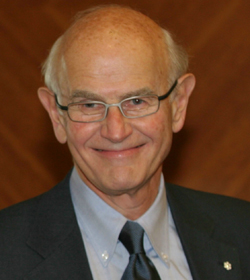Got a brain? The new KNC Sports Concussion Project might have a home for it. After you're done with it, of course.
 Led by Dr. Charles Tator, Neurosurgeon, TWH, the project will study the possible link between repeated concussions and late deterioration of brain function. Until recently, concussions were dismissed as a minor medical event. However, today we know that a concussion is a brain injury and that multiple concussions can result in long-term consequences, which may range in severity. In the most severe cases, some professional athletes have acquired degenerative brain diseases that resemble Alzheimer's or Parkinson's Disease.
Led by Dr. Charles Tator, Neurosurgeon, TWH, the project will study the possible link between repeated concussions and late deterioration of brain function. Until recently, concussions were dismissed as a minor medical event. However, today we know that a concussion is a brain injury and that multiple concussions can result in long-term consequences, which may range in severity. In the most severe cases, some professional athletes have acquired degenerative brain diseases that resemble Alzheimer's or Parkinson's Disease.
The research team is currently studying the impact of concussions on professional football players who have donated their brain to this medical research. The project has been endorsed by the CFL Alumni Association, which has played an active role in support of the project.
The CFL is taking steps to promote concussion awareness, prevention, management and research. At the centre of the sport's efforts is a new campaign that aims to distribute simple-to-follow "concussion cards" and posters to hundreds of thousands of athletes and coaches across the country. The cards and posters spell out how to recognize the symptoms of a concussion and stress the importance of not rushing an athlete with any symptoms back into action.
 "We don't want people, especially young people, to be couch potatoes. We want to encourage participation—safe participation," said Dr. Tator, speaking at a press conference announcing the new campaign and the KNC Sports Concussion Project. Dr. Tator is also founder of ThinkFirst Canada, a leading non-profit organization dedicated to the prevention of brain and spinal cord injuries.
"We don't want people, especially young people, to be couch potatoes. We want to encourage participation—safe participation," said Dr. Tator, speaking at a press conference announcing the new campaign and the KNC Sports Concussion Project. Dr. Tator is also founder of ThinkFirst Canada, a leading non-profit organization dedicated to the prevention of brain and spinal cord injuries.
He urged parents, coaches and players to understand the signs and symptoms of concussion, including confusion, dizziness and fuzzy vision, to ensure an athlete never returns to play while symptomatic, and that they follow a very careful and gradual, medically supervised step-by-step protocol before returning an athlete to play.
Tator also called on governments and the public to help fund the KNC Sports Concussion Project.
"CFL alumni support this research and have been working actively with Dr. Tator and his team," said Leo Ezerins, Executive-Director of the Canadian Football League Alumni Association. "By deepening our understanding of this issue, we can ensure that today's practices and future practices are indeed best practices."
Definition of a concussion:
A concussion is a brain injury caused by movement of the brain within the skull, either by a direct blow or by a whiplash effect. The movement of the brain causes damage that changes how brain cells function, leading to symptoms that can be physical (headaches, dizziness), cognitive (problems remembering or concentrating), or emotional (feeling depressed). A concussion can result from a blow to the head or body in any number of activities including receiving a check in hockey, falling from a jungle gym, being in a motor vehicle collision, or slipping on an icy sidewalk.
Although concussions are often referred to as "mild traumatic head injuries" and a single concussion usually resolves uneventfully, concussions have the potential for serious and long-lasting symptoms and so must be treated carefully and in consultation with a physician.
Source: ThinkFirst
